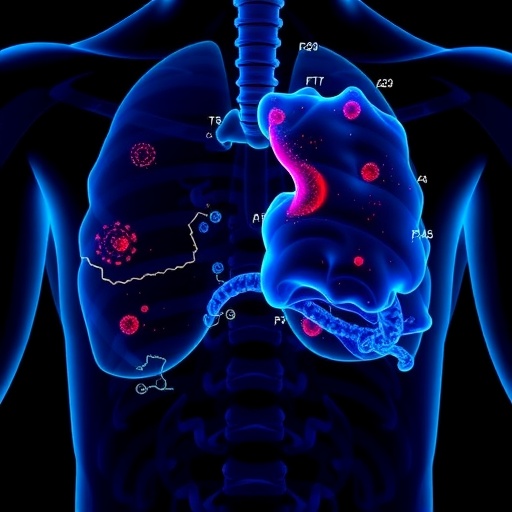
A groundbreaking study recently published in BMC Cancer unveils a novel approach to understanding the intricate relationship between pre-diagnosis plasma proteomic profiles and overall survival in patients with colon cancer. By analyzing blood samples taken years before cancer diagnosis, researchers have uncovered distinct proteomic signatures that not only reflect early biological changes but also strongly predict survival outcomes. This compelling research promises to redefine prognostic evaluation in colon cancer, pushing the boundaries of precision oncology.
Colon cancer remains one of the most prevalent and lethal malignancies globally, with survival heavily dependent on disease stage at diagnosis. While current prognostic models predominantly rely on pathological staging and demographic factors, they often lack sufficient sensitivity to anticipate patient outcomes. Addressing this gap, the recent study leverages advanced proteomic technologies to explore the plasma protein milieu years before clinical diagnosis, hypothesizing that early molecular alterations in circulating proteins could herald tumor behavior and patient prognosis.
Using plasma collected an average of nearly eight years before colon cancer diagnosis from participants in the extensive UK Biobank cohort, the research team applied Olink proteomics technology, a cutting-edge platform enabling high-throughput quantification of numerous proteins simultaneously with remarkable accuracy. This approach allowed the interrogation of protein landscapes long before tumor detection, offering unprecedented insight into the tumor microenvironment’s precancerous alterations.
The study delineates two distinct proteomic profiles corresponding to early and late stages of colon cancer, highlighting a temporal and biological complexity that challenges conventional paradigms. In early-stage cases, a 10-protein panel emerged, implicating biological processes such as extracellular matrix remodeling and immune evasion. These findings suggest that even before cancer is clinically evident, significant perturbations in the tissue scaffold and immune surveillance mechanisms are underway, potentially setting the stage for malignant transformation.
Specifically, the deregulation of innate immune activation pathways was prominent in the early-stage proteomic signature. This observation aligns with the growing understanding that cancer progression is not merely a result of tumor-intrinsic events but also reflects the dynamic interplay with the host immune system. The immune evasion tactics captured in the plasma proteome seem to foreshadow more aggressive disease courses, correlating with poorer survival post-diagnosis.
On the other hand, late-stage colon cancer exhibited a distinct 8-protein pre-diagnosis profile that intertwined pathological hallmarks of cell adhesion, angiogenesis, and pro-inflammatory responses. These processes are intimately linked
Tags: advanced cancer research methodologiesblood biomarkers for cancer survivalearly biological changes in cancermolecular alterations in cancerOlink proteomics technologyplasma proteomics and colon cancerpre-diagnosis plasma protein profilesprecision oncology advancementsprognostic evaluation in colon cancerproteomic signatures and cancer prognosissurvival outcomes in colon cancerUK Biobank cohort study





